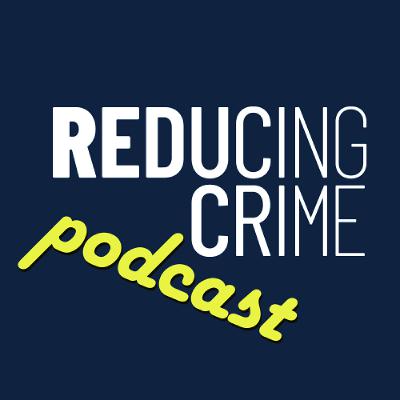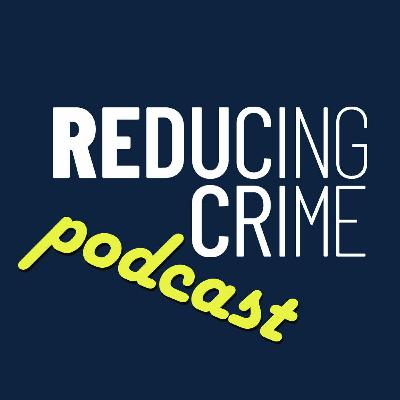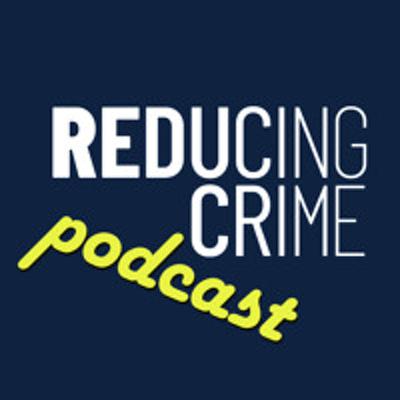Discover Reducing Crime
Reducing Crime

 Reducing Crime
Reducing Crime
Author: Jerry Ratcliffe
Subscribed: 193Played: 3,519Subscribe
Share
© All rights reserved
Description
A monthly podcast featuring conversations with influential thinkers in the police service and leading crime and policing researchers working to advance public safety. Often amusing, often enlightening, always informative. Jerry Ratcliffe (professor and former police officer) chats to a range of international guests covering police, policing, crime science, criminology, criminal justice, and public safety policy. Details and transcripts at reducingcrime.com/podcast.
90 Episodes
Reverse
The episode features a conversation with Dr. Obed Magny, a former Sacramento police officer and co-founder of the American Society of Evidence-Based Policing. He discusses emotional intelligence and its importance in policing, including how it can help officers de-escalate tense situations by reading the room and managing their own emotions. Magny shares how he would use emotional intelligence tactics like distracting arguing parties or engaging with them in unexpected ways to diffuse domestic disputes. The discussion highlights the lack of training on soft skills like emotional intelligence compared to technical policing skills, and how developing emotional intelligence can benefit police culture and community relations.
Chuck Tyree has served with New York State’s Division of Criminal Justice Service for over a decade and currently supervises programs in their Office of Public Safety. He oversees the Gun-Involved Violence Elimination (GIVE) initiative, as well as manages grant-funded programs, coordinates statewide technical assistance, and facilitates research into evidence-based policing strategies. In this wide-ranging chat with Jerry Ratcliffe, they cover everything from mental health during man-made and natural disasters to the state’s gun and intimate partner violence initiatives.
Ben Bradford is Professor of Global City Policing at University College London, where he is Director of the Centre for Global City Policing. He chats to Jerry Ratcliffe about police legitimacy, his research on what people want from the police, and what law enforcement leaders need to know about improving trust in policing.
Jeremy Wilson is a Professor in the School of Criminal Justice and the Founding Director of the Police Staffing Observatory at Michigan State University. Before that, he was a Behavioral Scientist at the RAND Corporation. His chat with host Jerry Ratcliffe covers police recruitment, what is wrong with so many operational allocation models, and how the world of police staffing is changing.
Matt Bland is the Chief Operating Officer of the Society of Evidence-Based Policing, and an associate professor with the Police Executive Programme at the University of Cambridge. Prior to that, Dr. Bland spent a decade and a half with Norfolk and Suffolk Constabularies, in a range of intelligence and crime analyst roles. We talk about his background as police analyst, the state of EBP, and how many divorces are required to be a serious organized crime detective.
Nola Joyce is a highly accomplished civilian policing professional who has served in leadership roles with the police departments of Chicago, Washington D.C., and Philadelphia where she held the rank of Deputy Commissioner. She is now a Partner and Principal Consultant for 21CP Solutions. In Chicago she helped implement the famous CAPS community policing program, and then in Philadelphia, she was instrumental in designing and evaluating key policing initiatives, such as the Philadelphia Foot Patrol Experiment and Philadelphia Policing Tactics Experiment. Her chat with host Jerry Ratcliffe discusses the role of civilian staff in policing, their mentorship and development, and the support they bring to police leaders. She emphasized the importance of balancing innovative ideas with relevance and acceptance from frontline officers.
Stacey Rothwell is the director of innovation action across seven police forces leading ERIN, the Eastern Region Innovation Network in the UK. After a career as a sworn officer, including as a detective in financial investigation, she returned in a civilian role, pioneering the innovative use of rapid video response in domestic violence cases. She chatted to Jerry Ratcliffe at the Somers Town Coffee House to discuss her career and the challenges of getting an experiment in rapid video response up and running.
David Décary-Hétu is a professor at the University of Montreal and chair of the Darknet and Anonymity Research Centre. Décary-Hétu's research focuses on studying data from offenders who use anonymity technologies like the dark web, cryptocurrencies, and encryption. He reveals that the dark web was originally developed by the military to enable anonymous communication, and that while the dark web and other anonymity technologies pose challenges for law enforcement, they are not the unbreakable havens for crime that are sometimes portrayed in media. The dark web enables new types of crime, but repeated disruptions of dark web markets can lead to some offenders becoming discouraged and quitting.
Loren Atherley is the Senior Director of Performance Analytics & Research and the Senior Research Scientist for the Seattle Police Department. He emphasizes the importance of taking an incremental, gradual approach to implementing evidence-based policing. He focuses on building data curiosity and buy-in within the department by providing useful analytical products and dashboards. He advocates for hiring "pracademics" - academics with applied experience - to help bridge the gap between research and practice in policing. This allows departments to leverage rigorous methodology while still understanding the practical realities. However, Dr. Atherley also acknowledges the need for caution when applying advanced analytics and machine learning to policing.
Gina Hawkins, experienced police leader, former chief, and President of the National Association of Women Law Enforcement Executives, discusses the importance of support networks and mentorship for women in policing, especially at the executive level. She emphasizes the ‘sorority-like’ connections among women leaders that provide crucial emotional and professional support. She talks about the personal sacrifices that come with taking on leadership, the need for better mental health and wellness support for police officers, as well as the historical stigma and lack of resources around this issue. Also discussed are the barriers and biases that women, particularly women of color, face in advancing to leadership positions in policing.
Jerry Ratcliffe talks to Professor Cliff Stott, a distinguished social psychologist specializing in crowd behavior, group identity, and public order policing. Stott discusses his background and early life experiences, and how this led him to study crowd psychology and develop the Elaborated Social Identity Model as an alternative to outdated mob psychology theories. Stott's work aims to debunk the myth that crowds inherently lose control and become irrational, arguing instead that crowd behavior is guided by shared social identities and norms. Instead, indiscriminate use of force by police can escalate crowd conflicts, by creating a shared identity of opposition to the police.
A line-of-duty death is the ultimate tragedy for a police department. Nobody likes to tempt fate, but planning ahead can make a significant difference should a catastrophe occur. After her police officer husband Greg was killed in the line of duty, Kassy Alia Ray founded the non-profit organization Serve & Connect and in this episode discusses how it fosters positive change through sustainable police-community partnerships. She also has practical proactive measures, borne of personal experience, that can help a police department navigate the unthinkable.
Adrian Raine is the Richard Perry University Professor of Criminology, Psychiatry, and Psychology at the University of Pennsylvania. Raine's pioneering work has used brain imaging and psychophysiological techniques to study the biological factors underlying antisocial and violent behavior, including in violent offenders and psychopaths. We have a fun and accessible chat about everything from psychopaths to the nature or nurture debate.
Jason Potts is the chief of the Las Vegas Department of Public Safety, and the president of the American Society of Evidence-Based Policing. Potts discusses the challenges of implementing evidence-based policing practices as a police leader, including getting buy-in from frontline officers, middle managers, and elected officials. In this chat, he emphasizes the importance of developing a culture that embraces ambiguity, risk, and failure as part of the process of implementing evidence-based reforms.
Thaddeus Johnson is a former police officer from Memphis who is now an Assistant Professor of Criminal Justice and Criminology at Georgia State University. He has extensively researched issues related to policing, crime, and racial disparities. Johnson discussed his experiences as a Black police officer and the challenges of navigating his racial identity in that role. He also highlighted the broader systemic racism and inequities in society that contribute to disparities in crime and policing outcomes. Johnson and his colleagues conducted a study examining the effects of police unionization and collective bargaining on police use of force. They found that increased police pay was associated with reduced police killings overall, but this benefit was only seen in non-unionized departments and not for Black citizens in unionized departments. In the episode Johnson discusses police accountability and oversight, transparency around officer disciplinary records, and how to do that without undermining the legitimate labor rights of officers.
Dr. Ian Adams talks about his career in policing, his transition to academia, and his recent policy research paper titled "Fuck: The Police." They discuss the use of profanity in policing and the need for a nuanced approach to regulating it. Adams conducted a survey experiment with police chiefs and sheriffs across the United States, finding a strong national consensus on the issue. He argues that policy should focus on the impact of profanity on public trust and professionalism rather than implementing blanket bans. Adams also highlights the creativity and problem-solving skills of police officers and the challenges they face in their daily work. Just be advised that the episode features strong, and often highly imaginative, language right from the start.
Grant Edwards APM, a retired commander from the Australian Federal Police, shares his experiences and struggles with post-traumatic stress disorder (PTSD) in this episode. He discusses the cumulative effect of trauma in policing and the importance of mental health management, and emphasizes the need for a mentally safe workplace and a culture that supports vulnerability and open communication. He suggests that organizations should prioritize mental health literacy and provide resources for self-care, such as movement and exercise. Grant also highlights the significance of leadership at all levels in creating a supportive environment for officers.
A former police officer and detective, Dr. Cynthia Lum is Distinguished University Professor of Criminology, Law and Society at George Mason University, and directs their Center for Evidence-Based Crime Policy. She is an appointed member of the National Academies of Sciences Committee on Law and Justice, an appointed trustee to the Council on Criminal Justice, and a board director for the National Policing Institute. We talk about evidence-based policing, implementing innovation, and how to overcome some of the barriers to progress.
In this episode, John Mina, the Sheriff of Orange County, Florida, discusses his background in law enforcement, including his time as Chief of Police in Orlando, and his decision to run for Sheriff. He talks about the benefits and challenges of being an elected law enforcement official and the unique role of the Sheriff in American policing. Mina also shares his views on recruitment and retention, the relationship between law enforcement and the media, and the issues facing sheriffs and police chiefs alike, such as recruitment, violent crime, homelessness, mental health, and officer wellness.
Dr. Peter Neyroud, former Chief Constable of Thames Valley Police and director of the Police Executive Programme at Cambridge University, discusses his career in British policing and his involvement in leadership challenges, police firearm use, and training. He highlights the importance of evidence-based policing and the need for clear guidance and policies in areas such as police shootings. He emphasizes the need for a strong evidence base to evaluate interventions and make informed decisions. Peter concludes by discussing the Police Executive Programme at Cambridge University and its role in training current and future police leaders.









really great